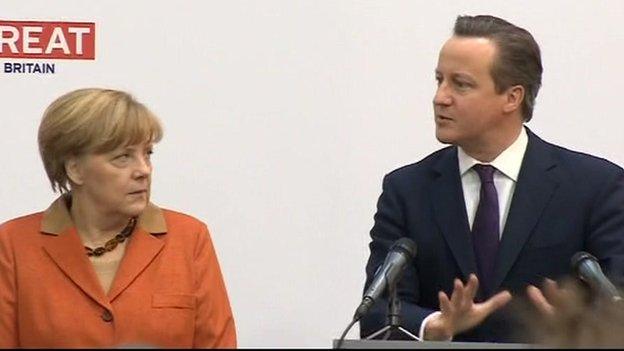Russia faces sanctions 'within days'
- Published

Angela Merkel and David Cameron met to discuss the crisis
Russia will face targeted sanctions "within days" if Moscow does not agree to talks with the new Ukrainian government in Kiev, David Cameron told MPs today.
The deadline - agreed between the prime minister and German Chancellor Angela Merkel last night - is next Monday's meeting of EU foreign ministers.
It will come a day after Sunday's referendum in Crimea.
US and EU officials will meet in London tomorrow to discuss who should face visa bans and asset freezes as well as to examine the practicalities and legalities of sanctions targeted against individuals.
'Illegal'
Downing Street is refusing to speculate about whether it will be Russian politicians and diplomats who face disruption to their finances and travel, or whether sanctions will also hit business leaders, including those living and working in London.
Sources suggest that President Putin will not be on the list drawn up tomorrow on the grounds that the international community is relying on him to de-escalate the crisis.
The leaders of the UK and Germany warned Russia not to seek to legitimise the Crimean referendum, which they described as "illegal and illegitimate."
Labour leader Ed Miliband told the Commons that the measures announced so far by the EU were insufficient to get Russia to think again.
Polish Foreign Minister Radoslaw Sikorski visited London this morning and declared: "This is a moment of test for the unity of the EU, for the unity of the Nato alliance."
Mr Sikorski pointed out that the Second World War had started on the "pretext of protecting ethnic minorities" and that the "people of Poland and the peoples of the Soviet Union paid a horrible price".
"I hope we have all learned lessons from how dangerous it is," he added.